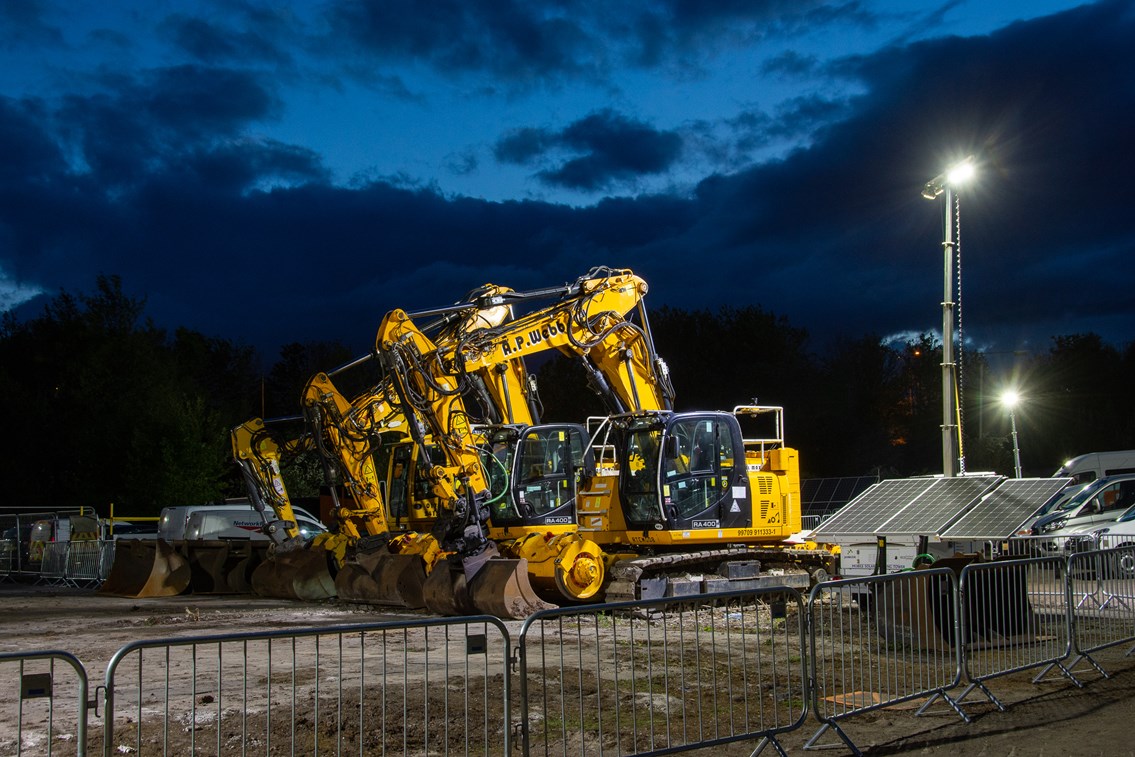Thursday 30 May 2019
Network Rail and Colas Rail Ltd achieve a 97% diesel-free “Site of the Future”
- Region & Route:
- National
A project led by the Network Rail and Colas Rail has used solar lighting and power generation to prove the viability of a sustainable ‘Site of the Future’, achieving 97% diesel-free operation in support of a major rail renewal project at Llanwern, South Wales.
The joint Network Rail and Colas Rail initiative used solar and battery technologies from Prolectric Ltd instead of diesel generators to save 6,000 litres of fuel, and more than 15 tonnes of CO2 during a 14-day project centred around a 72-hour possession over the early May bank holiday weekend.
The results are being viewed as a significant achievement that marks an environmental milestone towards clean, carbon-free off-grid working, in support of Network Rail’s target to reduce non-traction energy consumption by almost 20% and carbon emissions by 25% by 2024.
Nick Matthews, Network Rail programme engineering manager, said: “In business improvement, generally a one or two percent gain is considered significant, so to achieve 97% at the first attempt is simply staggering. Saving close to 6,000 litres of diesel is the same as driving a family car at 40 mpg twice around the circumference of the world.
“It’s also very clear where we have learnt the lessons from Llanwern so we can close that small gap. We really want to get to that 100% fuel free-figure by the time of our next challenge, planned for a rail renewal project later in the summer.”
Solar lighting and power generation technologies were used across the site covering more than 21-acres. This included access roads, the welfare cabin area, car parking and the track working area itself, where the London to Cardiff main line meets the Llanwern steelworks spur, near Newport. The project spanned a period of 14 days leading up to and following 72-hour possession, with more than 70 rail staff employed on site.
Three 25kW solar generators replaced conventional diesel generators providing light and heat for seven welfare cabins, including site offices, a canteen, toilets and a drying room.
A total of 21 solar tower lights illuminated the site compound, car parking and work preparation areas, as well as being deployed on the trackside, where 200m of battery-powered link lighting was also used and column street lights were positioned along the access road to the site.
Matthews continues: “It was just as important to explore and extend the range of renewable applications, including a new solar-powered camera security system. We were also able to demonstrate the versatility of using portable lithium battery packs, recharged as necessary from the solar generators to power dust suppression systems, water cooler stations and point motors.”
Using diesel generators to support rail renewal work has been the only option for reliable off-grid power. Now viable solar technologies are being seen as a vital contribution to non-traction carbon targets, as well as to reduce the noise, smell and air pollution from diesel exhausts, especially next to residential areas.
“The environmental impact of running diesel generators all day on a major worksite like Llanwern is absolutely huge,” explains Matthews. “It’s not just about carbon emissions; our lineside neighbours are very important to us. By using solar harvesting, we’re not polluting their environment with unwelcome fumes and noise.”
Ryan Ballinger, production manager for Colas Rail, explains: “We have worked closely to drive the development of suitable on-site solar tower lights and walking lights. Now at Llanwern we have been able to add solar generators for the first time and moving forward we want to add smaller plant and tools such as disk saws and band saws.
“There’s no doubt these technologies are going to be a complete gamechanger. Now, we need to push on and get to the point where they are just business as usual.”
The Llanwern project not only provided feedback to help refine the solar and battery technologies, but also identified energy-efficiency initiatives that can contribute to 100% diesel-free operation.
Contact information
Passengers / community members
Network Rail national helpline
03457 11 41 41
Latest travel advice
Please visit National Rail Enquiries
Journalists
Network Rail press office -Grete Luxbacher
Senior media relations manager
Network Rail
020 3356 8700
07710 959721
grete.gogay@networkrail.co.uk
About Network Rail
We own, operate and develop Britain's railway infrastructure; that's 20,000 miles of track, 30,000 bridges, tunnels and viaducts and the thousands of signals, level crossings and stations. We run 20 of the UK's largest stations while all the others, over 2,500, are run by the country's train operating companies.
Usually, there are almost five million journeys made in the UK and over 600 freight trains run on the network. People depend on Britain's railway for their daily commute, to visit friends and loved ones and to get them home safe every day. Our role is to deliver a safe and reliable railway, so we carefully manage and deliver thousands of projects every year that form part of the multi-billion pound Railway Upgrade Plan, to grow and expand the nation's railway network to respond to the tremendous growth and demand the railway has experienced - a doubling of passenger journeys over the past 20 years.
Follow us on Twitter: @networkrail
Visit our online newsroom: www.networkrailmediacentre.co.uk

